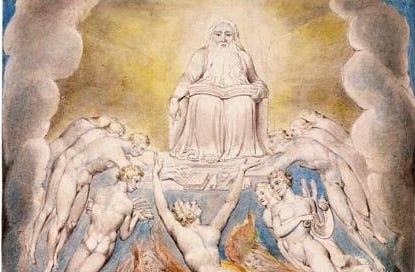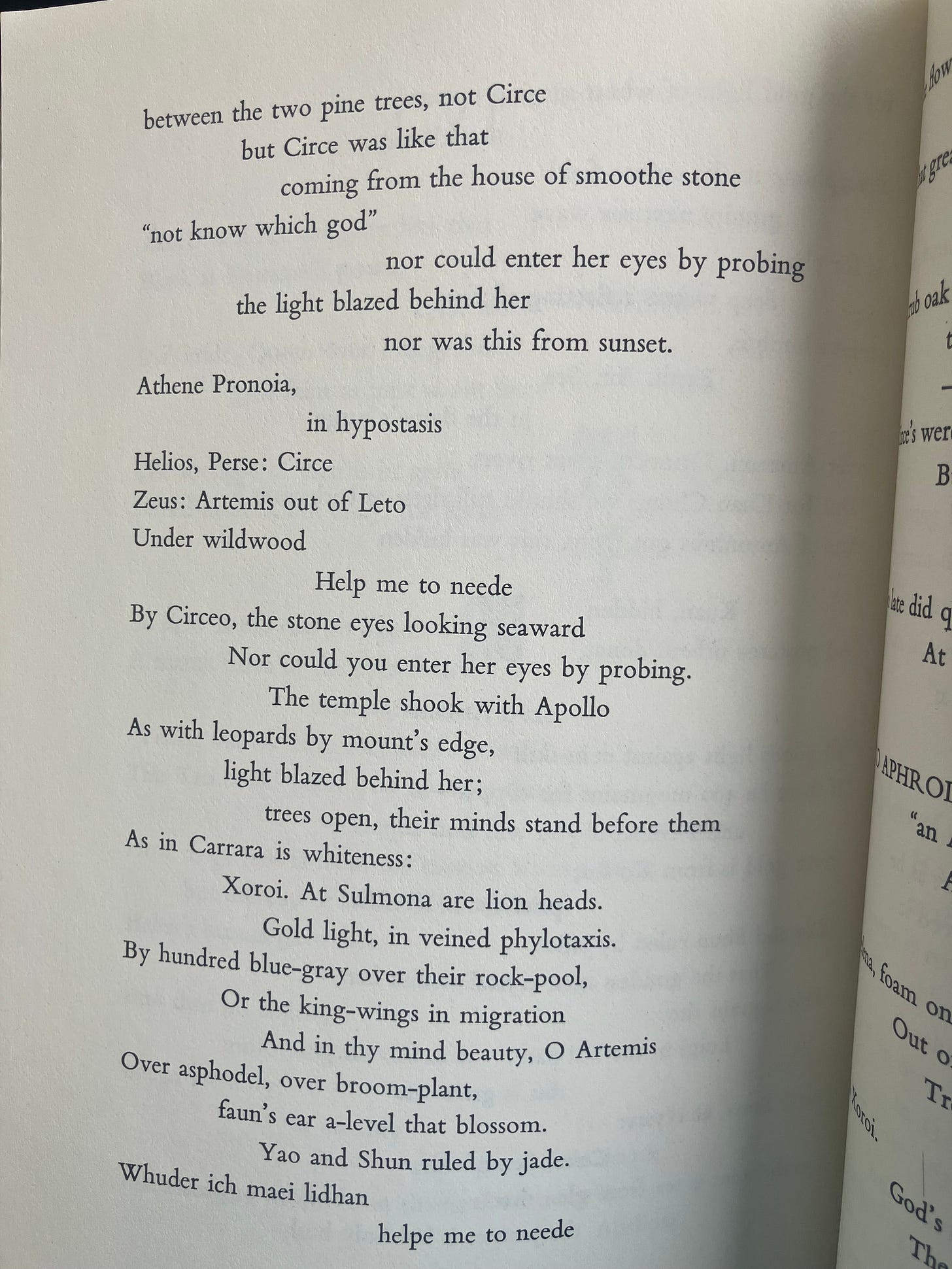And I saw thrones, and they sat upon them, and judgment was given unto them: and I saw the souls of them that were beheaded for the witness of Jesus, and for the word of God, and which had not worshipped the beast, neither his image, neither had received his mark upon their foreheads, or in their hands; and they lived and reigned with Christ a thousand years.
Rev. 20:4 King James Version
Another product of Pound’s long confinement in the bughouse, Thrones De Los Cantares is longer than Section: Rock-Drill, but is otherwise fairly similar. There’s (for the most part) less unpleasantness, but fewer moments of sheer beauty. The Thrones of the title refer I believe to good government and Dante’s Paradiso, although I have yet to read that particular chunk of La Commedia. The cosmic swirl of colliding and blending eras and characters remains a fascinating quality of the poem.
I’ve tried to walk a line in this project between dismissing Pound’s politics and giving the poetry its due. If it isn’t obvious, I tend to view The Cantos as a cautionary tale about subordinating art to politics, and the second half of Pound’s career more generally as a warning about going in for totalizing theories about who is to blame for this or that depredation of modernity.
Joyce is never far from my mind in this regard, as one of the only major modernists to avoid some sort of flirtation with twentieth century extremism (which did not stop the first generation or two of his readers from reading them into his work.) When I first read Ulysses & his other novels I speculated to myself that maybe this was because the style is itself so nearly totalitarian, the absolute art-object of the Gesamtkunstler imposing his consciousness on you for sixhundred pages and change, but this impression did not survive my first acquaintance with Pound's mature work, which is as demanding if not more-Joyce usually sticks to english-and obviously dubious in a way that Joyce is not. On reflection over the course of reading the Canto's I've come to wonder if oart of it doesn't have to do with class: Joyce leans into, and clearly takes great joy in the demotic, and his utopia in speech, the New Bloomusalem, is distinctly lower middle class. Pound in common with many American radicals partly constructed himself as against his "insane" homeland as a European aristocrat, with all of the resentments of the leveling and mass-acculturating effects of modernity that walk alongside it. Joyce, coming from a rather different society is more readily able to dodge this temptation and embrace in certain ways a version of his own class background in his works.
One of you -I thought maybe
at first but I think it might’ve been - made a remark a while ago comparing the Cantos to Walter Benjamin’s massive, unfinished Arcades Project. I have only ever briefly perused that enormous wreck, but I see the logic.1 Speaking of western Marxism, I actually wonder along those lines if Georg Lukacs isn’t someone who could be compared to Pound. One of the great critical minds of the era, in the chaos of the twentith century he like Pound gave himself to a system, and clung to it like grim death-even after it abused and denounced him-down to the end of his life. The liberal writer, which one is, is always liable to view such embraces of messianic politics as foolishness, weakness or avarice, and as you are all no doubt tired of being reminded, I generally do. It would be twempting to try to integrate these speculations into the kind of crypto-Straussian argument about history and European nihilism and political extremism that I've been making over the last few of these, but I will for the most part refrain I think perhaps at the rist of generalizing a bit too much, the stupidity or following Hartz the liberalism-by-nature of the American regime does forestall the kind of violent, total "billions must die" style politics of old Europe, but it also by paradox tends to foster in native-born thinkers, even those who have links to the olf agricultural lower-middle classes, a sense of alienation from nature, from the source of all things. I'm not sure.Somewhere along the way I forgot to talk about perennialism, which is a major vein running through the Cantos and Pound’s mature work, and was indeed a central theme of much thought at the turn of the last century. The most-remembered driver of this was James Frazier’s The Golden Bough, a vast (even in its abridged single volume form) compendium of folklore, mythology & religious thought, while the work of Joseph Campbell is probably the most popular version of this in the contemporary world. The essential belief of this “system” might be a certain essential unity of human belief, human tradition, etc. An effort to preserve some essence after the death of God, or restore some pagan vitality, which is probably closer to what Pound was looking for.
I haven’t had the opportunity to really explore Pound’s metaphysics, largely because there isn’t much of them in The Cantos, being as they are so dedicated toward scapegoating those Pound deemed responsible for the Great War and asserting good government along Douglasite lines. He appears to have held that some sort of line of spiritual-poetic development extended from the Eleusinian mysteries through the troubadours in the Middle Ages down through into the poetry of the modern age. It also might be worth comparing Pound to Robert graves at some point, although the gender dynamic is inverted. In any case, next week will be the big one, the conclusion, possibly my favorite part of Pound’s poem. Thanks for reading!
As I’ve mention from time to time, my real introduction to the political-aesthetic life of the mind was largely carried out by comics-&-tv bloggers who had gone to college and then grad school during the “theory” era and were thus deeply influenced by the more general Frankfurt school approach. The specific thinker I was most influenced by was very interested in Benjamin, and so I’ve absorbed a lot of him secondhand. I’m haunted and fascinated by much of his work, which I’m also frequently unsure of just what to make of. I gather from various sources (notably Blake Smith’s acrid asides) that he’s become a somewhat middlebrow figure, which I suppose comes for us all eventually.






It was me, I said it was nice communists and fascists each have an impressive-looking unreadable big black book they can put on their shelves and not read. I once read a very good essay comparing Lukacs and Eliot if not Pound on the shared ground of anti-liberal romantic anti-capitalism, as summarized here:
https://grandhotelabyss.tumblr.com/post/680296737558200320/michael-north-eliot-luk%C3%A1cs-and-the-politics
Good post. The interesting thing about Frazier, as you may know, is that while his actual if not quite overt aim was skeptical (to question religion by associating it with magic), he was often taken to be revealing an esoteric truth behind religion, as in “The Wasteland.”
I wouldn’t put East Germany in the same category as fascist Italy, despite its repressive regime